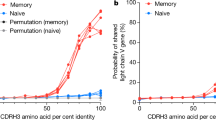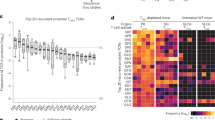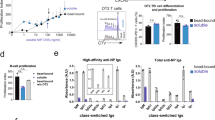Abstract
THERE are a number of arguments against the idea1 that self-tolerance depends on a purge of all self-reactive clones early in development. First, antigens which appear later in development, for example, Ig idiotypes, must induce tolerance to themselves. Second, autoimmune diseases are often reversible, implying that when anti-self-reactive cells arise late, they may still be controlled. Third, the recent finding (refs 2–4 and L. M. Pilarski and A.J.C., unpublished) that single clones of antibody-forming cells rapidly produce variants also implies a continuous monitoring and control of immunocompetent cells. Self-reactive variants must arise during many immune responses, and must normally be prevented from causing autoimmune disease. Fourth, the distinction between anti-self and anti-not-self specificities is obviously not clear-cut. Given the great diversity of self components in mammals, it is probable that almost any antibody will react to some self antigens with low affinity.
This is a preview of subscription content, access via your institution
Access options
Subscribe to this journal
Receive 51 print issues and online access
$199.00 per year
only $3.90 per issue
Buy this article
- Purchase on Springer Link
- Instant access to full article PDF
Prices may be subject to local taxes which are calculated during checkout
Similar content being viewed by others
References
Burnet, F. M., The Clonal Selection Theory of Acquired Immunity (Cambridge University Press, London and New York, 1959).
Cunningham, A. J., Contemp. Top. molec. Immun., 3, 1 (1974).
Cunningham, A. J., and Pilarski, L. M., Eur. J. Immun., 4, 319 (1974).
Cunningham, A. J., and Fordham, S., Nature, 250, 669–671 (1974).
Hildemann, W. H., and Walford, R. L., Proc. Soc. exp. Biol. Med., 123, 417 (1966).
Wilson, J. D., Warner, N., and Holmes, M. C., Nature new Biol., 233, 81 (1971).
Klemparskaya, N., Immunology, 25, 11 (1973).
Pirofsky, B., Cordova, M., and Imel, T. L., J. Immun., 89, 767 (1962).
Gerard, M., Am. J. clin. Path., 43, 487 (1965).
Gilliland, B. C., Baxter, E., and Evans, R. S., New Engl. J. Med., 285, 252 (1971).
Casey, F. M., Dodd, B. E., and Lincoln, P. J., Vox. Sang., 23, 493 (1972).
Amsel, S., Sebabi, E. C. T., and Nzaro, E., Clin. exp. Immun., 16, 657 (1974).
Cunningham, A. J., and Szenberg, A., Immunology, 14, 599 (1968).
Cunningham, A. J., Prog. Allergy, 17, 5 (1973).
Cunningham, A. J., Aust. J. exp. Biol. med. Sci., 46, 141 (1968).
Schalm, O. W., Veterinary Hematology (Lea and Febiger, Philadelphia, 1965).
Author information
Authors and Affiliations
Rights and permissions
About this article
Cite this article
CUNNINGHAM, A. Large numbers of cells in normal mice produce antibody components of isologous erythrocytes. Nature 252, 749–751 (1974). https://doi.org/10.1038/252749a0
Received:
Revised:
Issue Date:
DOI: https://doi.org/10.1038/252749a0
Comments
By submitting a comment you agree to abide by our Terms and Community Guidelines. If you find something abusive or that does not comply with our terms or guidelines please flag it as inappropriate.



